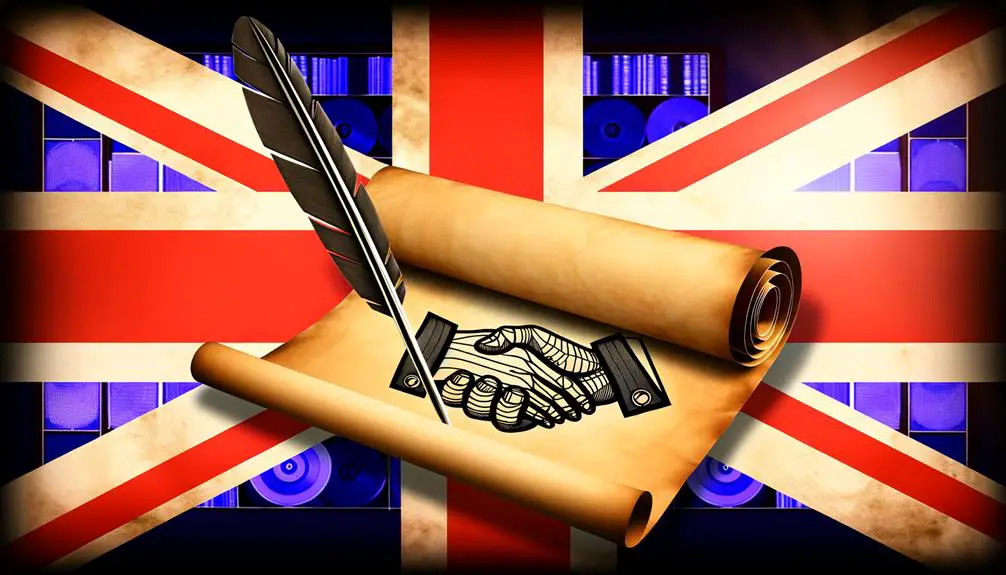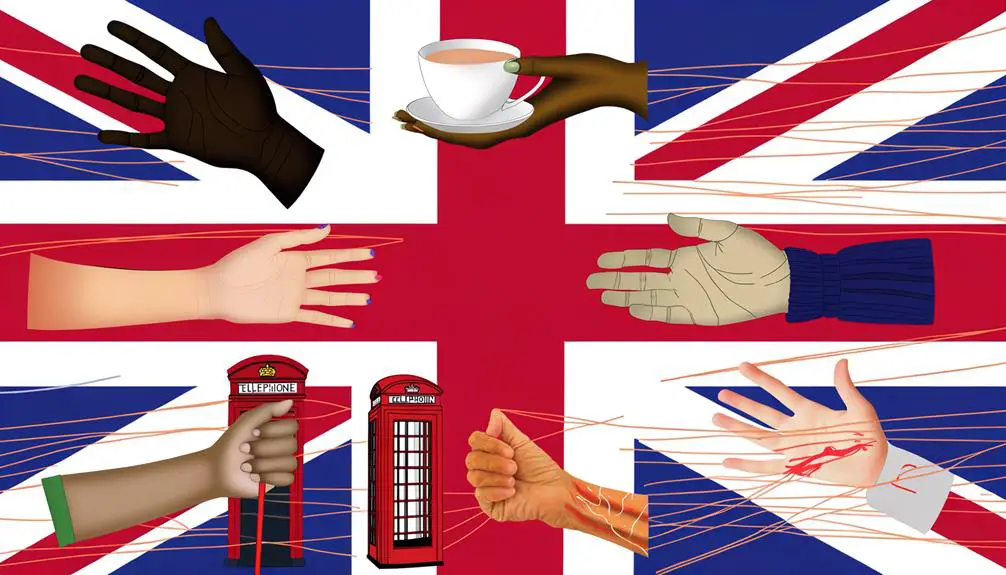In British slang, when you call someone 'blood,' you're tapping into a rich history of camaraderie and loyalty. Originating from deep bonds that surpass family ties, it's transformed to symbolize the unity found within friends and chosen family. It's about those who stick by you, sharing in your struggles and triumphs. In modern, multicultural Britain, 'blood' has blossomed into a greeting among diverse communities, celebrating solidarity and connection. The digital era has further expanded its use, showcasing the adaptability of slang to express complex relationships in new contexts. Each variation of 'blood' carries layers of meaning, revealing more about Britain's social fabric.
Key Takeaways
- 'Blood' in British slang signifies deep friendship, loyalty, and unity among peers.
- It represents a chosen family or community based on mutual respect and support.
- Originally used in underworld and street cultures, it now transcends various social groups.
- In multicultural Britain, 'blood' reflects the diversity and solidarity within different cultural communities.
- The term has evolved in the digital age, extending its meaning to digital kinship and solidarity across social media platforms.
The Origins of 'Blood'

The term 'blood,' in British slang, has its roots steeped in history, tracing back to early vernacular used to signify deep bonds beyond mere familial ties. Understanding how this term evolved within the historical context, particularly in relation to gang affiliations, is vital. Initially, 'blood' signified a profound connection among members of society who shared common interests or goals, especially when formal institutions fell short in providing security or belonging.
Analyzing its transformation, you'll find that the term became emblematic of loyalty and unity within the underworld and street cultures. Gang affiliations leveraged 'blood' to express a kinship that transcended biological relations, embedding a sense of allegiance among members. This adaptation of 'blood' reflects a societal shift where individuals sought belonging and protection in organized groups, mirroring a quasi-familial structure.
The historical context is important for grasping the term's gravity. It wasn't merely a casual reference but a declaration of one's loyalty to a cause or group, often implying a readiness to defend that allegiance. Through this lens, 'blood' embodies a complex web of social dynamics, highlighting how language evolves to mirror changes in societal structures and relationships.
Signifying Friendship and Loyalty
Shifting from its historical roots, 'blood' now embodies the essence of friendship and loyalty among peers, serving as a proof to the enduring bonds that form in shared experiences and struggles. This modern interpretation transcends the biological connotation of the term, elevating it to symbolize a chosen family, where the connections aren't defined by genetics but by a deep sense of mutual respect, understanding, and support.
In this context, 'blood' becomes a testament to the strength of relationships forged in various social dynamics, from schoolyards to workplaces, highlighting how individuals come to rely on one another in a world that's increasingly complex and challenging. It's a recognition that, sometimes, the family ties we choose can be as strong, if not stronger, than those we're born into.
Moreover, this usage reflects an evolution in social dynamics, where traditional definitions of community and belonging are being expanded. It underscores the idea that loyalty and friendship are as foundational to human connection as any biological relationship, thereby redefining what it means to be 'family'. Essentially, 'blood' in British slang captures the profound reality that who we stand with often defines us as much as where we come from.
Blood in Multicultural Britain

In multicultural Britain, 'blood' has taken on new layers of meaning, reflecting the diverse fabric of its society and the myriad ways communities interact and connect. This term, deeply rooted in the lexicon of kinship and affinity, now traverses beyond its origins to mirror the cultural diversity that shapes the UK. It's a reflection of how language adaptation is not just about adopting new words but also about the evolving meanings of existing ones in response to changing demographics and social landscapes.
As you navigate through the bustling streets of cities like London, Birmingham, or Manchester, you'll hear 'blood' used in greetings and conversations among friends, an indication of the term's elasticity and its absorption into the vernacular of various cultural groups. This adaptation signifies more than just a colloquial handshake; it's a reflection of how communities forge connections, adopting and adapting linguistic elements from each other. It showcases how cultural diversity and language adaptation go hand in hand, creating a dynamic, ever-evolving tapestry of communication.
In this landscape, 'blood' stands as a symbol of the unity and solidarity that can emerge in a multicultural society, embodying the complex but beautiful ways in which different cultures can intersect, influence, and enrich each other.
Evolution in the Digital Age
Digital transformation has greatly influenced the evolution of 'blood' in British slang, adapting its usage and meanings in the context of online communities and social media platforms. The digital landscape has not only accelerated the spread of this term but also enriched its semantic fields, reflecting broader shifts in digital linguistics and online vernacular.
- Expansion of Meaning: In the digital domain, 'blood' transcends its traditional connotations, embodying notions of digital kinship and solidarity among users. This expansion reflects how online interactions have rewired our understanding of community and belonging.
- Increased Visibility: Social media platforms serve as a catalyst for the rapid dissemination of slang, with 'blood' being no exception. Its presence across diverse digital spaces has elevated its status from niche to mainstream, illustrating the power of online networks in shaping language trends.
- Contextual Fluidity: The digital age has introduced a new layer of contextual fluidity to 'blood'. Depending on the online environment, its meaning can shift, showcasing the adaptability of slang in digital vernacular. This fluidity underscores the importance of context in interpreting slang within digital communications.
These elements highlight the dynamic interplay between digital culture and linguistic evolution, underscoring the role of digital platforms in reshaping the contours of British slang.
Case Studies and Anecdotes
To illuminate the evolution of 'blood' as British slang in the digital era, we'll explore a series of case studies and anecdotes that reveal its dynamic application and interpretation across various online platforms. One pivotal case involves a viral tweet from a London-based user who referred to a stranger assisting him during a commute as "a real blood," highlighting the term's expanded use beyond familial ties to signify deep appreciation or connection. This instance underscores how urban vernacular adapts to convey complex social bonds in concise, impactful language.
Another anecdote comes from an online gaming community where members, spanning diverse backgrounds, adopted 'blood' to denote team solidarity and mutual respect. This usage reflects the term's versatility in fostering a sense of belonging and camaraderie, transcending its origins in physical kinship to embrace chosen affiliations.
These examples demonstrate how 'blood,' once rooted in describing biological relationships, has morphed within the urban vernacular to articulate a broader spectrum of associations. Its evolution is indicative of the fluid nature of language, especially slang, in mirroring societal shifts and the human desire for connection.







